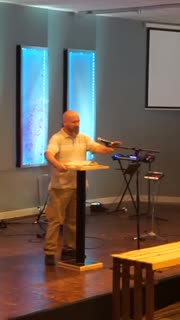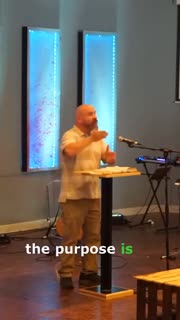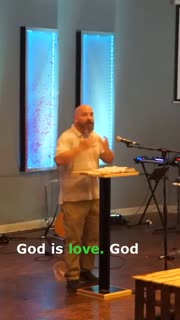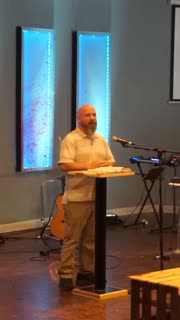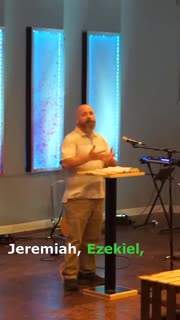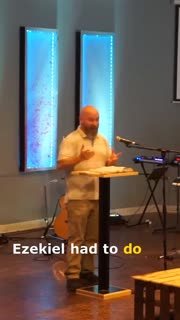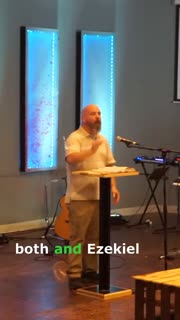Faithfulness and Hope: Lessons from Old Testament Prophets
Devotional
Sermon Summary
Bible Study Guide
Sermon Clips
### Quotes for Outreach
1. "In the beginning there was chaos and then God spoke creating light land and life itself thus Begins the Old Testament a collection of sacred texts that tell the story of God's relationship with Humanity from the creation of the world to the formation of the nation of Israel the Old Testament weaves together history poetry prophecy and wisdom literature it introduces us to pillars of our faith like Abraham Moses King David and many more to trials and triumphs the Old Testament reveals God's faithfulness his Justice and mercy laying the foundation for the coming of the Messiah and offering Timeless lessons for Humanity." (-1212 seconds)
2. "The purpose is to believe in God and do as he says I threw it in there Mike to worship him to serve him to glorify him and only then can we be glorified in return because we are doing what we were supposed to do but too many of us are screwdrivers trying to be Hammers and hammers trying to be screwdrivers and it doesn't work we either destroy ourselves or we destroy others in the process and we don't seem to get it the world doesn't seem to get it." (31 seconds)
3. "God is love God loves you in their response if God loves us then why does he allow all these bad things to happen sure the israels were thinking the Israelites were thinking the same thing maybe that's why Daniel didn't have as much of a problem as Ezekiel and Jeremiah because their world was going great it's easy to believe in God when your world is going great when America at its high point a lot of people believed in God but when the problems came when Pearl Harbor hit when the Nazis started attacking the world when all this other stuff went down Vietnam and and Cuba and all these other crazy situations that have happened in our history and slavery and and all that stuff we think where is God in this." (43 seconds)
4. "God is love and you have to remember that because sometimes it's hard to remember that it was hard for the writers of Lamentations to remember that sometimes it was it's hard for the writers of the Psalms to remember that God is love because all these horrible things keep happening in the world over and over and over again and all we can remember is that God is love and the reason that we don't get it is because we care more about our Cosmetics than we do about our substance and God cares more about our substance than he does about our Cosmetics it doesn't matter to him if you have one arm or two arms when you come to him in glory because he wants you in glory he wants your soul not your body he doesn't want you healthy he wants you spiritually healthy he wants you to make it and whatever it takes to get you there he's going to do it he's going to make sure you make it because he loves you he's your father and he cares more than you ever will for yourself." (56 seconds)
5. "We think it matters what we do it does it does but it doesn't matter how much God loves us you can do whatever you want to do you can hate God as much as you want to hate him you can disobey him as much as you want to disobey him his love for you is never going to waver it's never going to change but you can't be his unless you do as he tells you to do because anything less than that is not faithfulness in God it's faithfulness in yourself and God knows that's a sickness in our souls and the sickness in our souls is worse than the sickness in our bodies or in our minds and he will get rid of it any way he can." (47 seconds)
### Quotes for Members
1. "Jeremiah Ezekiel and Daniel three awesome prophets they are the two three and four of the four major prophets Mike preached on Isaiah last week and it's interesting that they're grouped together the way they are because the Old Testament isn't necessarily chronological the Bible isn't chronological but it does start with Genesis and ends with Revelation and that's that's that's very convenient and in the middle is everything kind of scrambled up but these prophets are actually grouped together uh because of the size of their books not because of who they were when they uh were around uh they are the major Prophets The minor Pro prophets had smaller books and Daniel kind of slipped into the Major Prophets because Hosea is the book I believe after Daniel and that's about the same size as Daniel actually it's just a little bit shorter uh so maybe the the the plum line there was uh you know just the size of Daniel's book to make the major prophet but these guys are the most remembered prophets as well and they're grouped together interestingly enough they are actually contemporaries with each other these three Isaiah was uh a little over a hundred years before Jeremiah and Jeremiah comes and he is the first of these three but while he's preaching Ezekiel and Daniel start their preaching as well or their their their Ministries as well so they were actually all contemporaries it's very possible that they knew each other and within the books themselves is correspondence with each other uh Jeremiah I believe corresponds with Daniel and Ezekiel corresponds with uh someone in there and you know Jeremiah goes and he he sends a message he sends a letter to the the the courts where Daniel is and so on and on it goes and so they kind of knew of each other at least we know that." (119 seconds)
2. "Jeremiah was left at home he was not taken he's the first one that we'll talk about Jeremiah was uh from the Priestly family we don't really know if he was going to be a priest but chances are he probably was especially with the words that he had from the Lord he was most definitely probably going to be a priest uh but uh those things were kind of done away with when the sieges started the sieges started because the Kings of Israel and the people themselves sold themselves out they had a God who loved them who guided them who got them into the promised land through a bunch of other mistrials and and Misadventures they finally got there and then they squandered it right they dropped the ball they stopped looking at God as though he was who he is and they started they stopped looking at themselves for who they were and started elevating themselves so God's here and they're here and eventually it kind of went like this in their hearts and their minds and they started worshiping other gods they started Living their lives the way they want to they started doing things they want to do they wanted a king because everybody else around them had a king they wanted uh glory and power and they wanted to do things their way they had a better idea how to do it and they went off and they chased that and unfortunately that's not how we're made we're not made to do those things." (98 seconds)
3. "Ezekiel had to do a lot of weird things Ezekiel had to lay on his side for months and months and months I think over a year and then he had to flip over and be on his other side for another year just to show people something about what God was saying he cut his hair off and he not a problem for me but he cut his hair off and he cut it all up some of it he cut up and some of it he burned burned and some of it he let the wind take away and then other of it uh a little bit more of it was the remnant so this was a sign and then he had to eat this unkosher food cooked over human feces at one point in front of everybody this is one point where Ezekiel said H Lord I don't want to do that I've eaten kosher my whole life not using the word kosher I've only eaten what you've wanted me to eat my whole life I don't think I can do that and God said fine you can use animal poop so he used cattle poop and he had had to do it but he did it he did it and he did it because God wanted him to do it interesting character bold bold in his prophecy Jeremiah bold." (71 seconds)
4. "Daniel was probably the first one taken he paid a little bit of a price he uh had to go to the king's court not too shabby he was given the King's food to eat you'd think that would be pretty good but then Daniel refused to eat the food that the king put before him and instead chose to follow the ordinances of God similar to what Ezekiel said Daniel said I'm not going to eat anything that the Lord doesn't want me to eat so he would only eat according to the dietary restrictions that God had placed on the Jews and the unic was a the head unic who really liked Daniel was a little upset a little worried I don't know what's going to happen if you keep doing this I'll give you I'll give you a couple days and and see what happens happens and after the time period that was allotted Daniel and his friends Shadrach mhach and Abednego looked great and the King was confused these guys what have these guys been eating they look they look very healthy and the unic told him and the King praised God for these people interesting this is interesting because then later Shadrach mesach and Abednego are in a situation where they refuse to bow to the god that put before them the bells are ringing and the horns are blowing and when that happens everybody in Babylon is supposed to bow down and and worship this God that's brought before them and Shadrach Meshach and Abednego refused to do that so the king says you're going to be in trouble if you don't do it and they say we don't care and he throws him in the furnace he comes out they bring him back out unharmed unburned there was another person in there with them the whole time which a lot of people believe is is a is a picture of Christ in the Old Testament a christophany and what does the king do praise His God and makes an ordinance these guys God is the God these guys God is the only God worthy of worship." (120 seconds)
5. "We got Jeremiah and Ezekiel preaching to their own people preaching to their brothers and sisters of Israel preaching that God is going to destroy Israel that God is going to eventually return them to Israel but not any time soon in fact Jeremiah both and Ezekiel are given the exact time when they're to come back when the when everything will be over which is 70 years Israel didn't want to hear that they didn't want to hear that they had other other prophets who were telling them hey don't worry everything's going to be fine two years tops and you're coming back to Israel that's a good message to hear and not only will you come back but your enemies will be destroyed the Babylonians will be overthrown the calans will be dead everything's going to be great hunky dory everybody will return all the borders will be restored and we will be a people again Jeremiah and Ezekiel had the same message no that's not going to happen in fact God is going to return you but most of you will be very old when that happens or gone and when that happens we won't own the country anymore it won't be ours it'll be somebody else's we'll be taking care of it for other kingdoms that's not a message they wanted to hear but that was the message God had for them and their people refused to listen to it but Daniel who is preaching to these Kings of other countries not his people he is in he is in a world of a completely different sort he is surrounded by Foreign dignitaries he is surrounded by royalty that isn't Israeli royalty and they're not only listening to him their hearts are changing because of Daniel's message the Kings themselves are being touched this is common throughout all the scripture if you look right Joseph had the same Ministry he was thrown into a foreign land and he was faithful to his God and and the king or the Pharaoh noticed it right and he interprets his dream and then he he sees the wisdom of this kid he says Hey I want you in charge of Egypt puts him in charge Daniel had the same opportunities over and over and over again because he outlived most of the kings that were put before him and every time these Kings changed their hearts because of Daniel's Ministry not so with Jeremiah and Ezekiel because they knew they knew what it took to be a good person they knew what it took to be a viable person and Israel didn't want to hear it." (162 seconds)
Ask a question about this sermon
1. "In the beginning there was chaos and then God spoke creating light land and life itself thus Begins the Old Testament a collection of sacred texts that tell the story of God's relationship with Humanity from the creation of the world to the formation of the nation of Israel the Old Testament weaves together history poetry prophecy and wisdom literature it introduces us to pillars of our faith like Abraham Moses King David and many more to trials and triumphs the Old Testament reveals God's faithfulness his Justice and mercy laying the foundation for the coming of the Messiah and offering Timeless lessons for Humanity." (-1212 seconds)
2. "The purpose is to believe in God and do as he says I threw it in there Mike to worship him to serve him to glorify him and only then can we be glorified in return because we are doing what we were supposed to do but too many of us are screwdrivers trying to be Hammers and hammers trying to be screwdrivers and it doesn't work we either destroy ourselves or we destroy others in the process and we don't seem to get it the world doesn't seem to get it." (31 seconds)
3. "God is love God loves you in their response if God loves us then why does he allow all these bad things to happen sure the israels were thinking the Israelites were thinking the same thing maybe that's why Daniel didn't have as much of a problem as Ezekiel and Jeremiah because their world was going great it's easy to believe in God when your world is going great when America at its high point a lot of people believed in God but when the problems came when Pearl Harbor hit when the Nazis started attacking the world when all this other stuff went down Vietnam and and Cuba and all these other crazy situations that have happened in our history and slavery and and all that stuff we think where is God in this." (43 seconds)
4. "God is love and you have to remember that because sometimes it's hard to remember that it was hard for the writers of Lamentations to remember that sometimes it was it's hard for the writers of the Psalms to remember that God is love because all these horrible things keep happening in the world over and over and over again and all we can remember is that God is love and the reason that we don't get it is because we care more about our Cosmetics than we do about our substance and God cares more about our substance than he does about our Cosmetics it doesn't matter to him if you have one arm or two arms when you come to him in glory because he wants you in glory he wants your soul not your body he doesn't want you healthy he wants you spiritually healthy he wants you to make it and whatever it takes to get you there he's going to do it he's going to make sure you make it because he loves you he's your father and he cares more than you ever will for yourself." (56 seconds)
5. "We think it matters what we do it does it does but it doesn't matter how much God loves us you can do whatever you want to do you can hate God as much as you want to hate him you can disobey him as much as you want to disobey him his love for you is never going to waver it's never going to change but you can't be his unless you do as he tells you to do because anything less than that is not faithfulness in God it's faithfulness in yourself and God knows that's a sickness in our souls and the sickness in our souls is worse than the sickness in our bodies or in our minds and he will get rid of it any way he can." (47 seconds)
### Quotes for Members
1. "Jeremiah Ezekiel and Daniel three awesome prophets they are the two three and four of the four major prophets Mike preached on Isaiah last week and it's interesting that they're grouped together the way they are because the Old Testament isn't necessarily chronological the Bible isn't chronological but it does start with Genesis and ends with Revelation and that's that's that's very convenient and in the middle is everything kind of scrambled up but these prophets are actually grouped together uh because of the size of their books not because of who they were when they uh were around uh they are the major Prophets The minor Pro prophets had smaller books and Daniel kind of slipped into the Major Prophets because Hosea is the book I believe after Daniel and that's about the same size as Daniel actually it's just a little bit shorter uh so maybe the the the plum line there was uh you know just the size of Daniel's book to make the major prophet but these guys are the most remembered prophets as well and they're grouped together interestingly enough they are actually contemporaries with each other these three Isaiah was uh a little over a hundred years before Jeremiah and Jeremiah comes and he is the first of these three but while he's preaching Ezekiel and Daniel start their preaching as well or their their their Ministries as well so they were actually all contemporaries it's very possible that they knew each other and within the books themselves is correspondence with each other uh Jeremiah I believe corresponds with Daniel and Ezekiel corresponds with uh someone in there and you know Jeremiah goes and he he sends a message he sends a letter to the the the courts where Daniel is and so on and on it goes and so they kind of knew of each other at least we know that." (119 seconds)
2. "Jeremiah was left at home he was not taken he's the first one that we'll talk about Jeremiah was uh from the Priestly family we don't really know if he was going to be a priest but chances are he probably was especially with the words that he had from the Lord he was most definitely probably going to be a priest uh but uh those things were kind of done away with when the sieges started the sieges started because the Kings of Israel and the people themselves sold themselves out they had a God who loved them who guided them who got them into the promised land through a bunch of other mistrials and and Misadventures they finally got there and then they squandered it right they dropped the ball they stopped looking at God as though he was who he is and they started they stopped looking at themselves for who they were and started elevating themselves so God's here and they're here and eventually it kind of went like this in their hearts and their minds and they started worshiping other gods they started Living their lives the way they want to they started doing things they want to do they wanted a king because everybody else around them had a king they wanted uh glory and power and they wanted to do things their way they had a better idea how to do it and they went off and they chased that and unfortunately that's not how we're made we're not made to do those things." (98 seconds)
3. "Ezekiel had to do a lot of weird things Ezekiel had to lay on his side for months and months and months I think over a year and then he had to flip over and be on his other side for another year just to show people something about what God was saying he cut his hair off and he not a problem for me but he cut his hair off and he cut it all up some of it he cut up and some of it he burned burned and some of it he let the wind take away and then other of it uh a little bit more of it was the remnant so this was a sign and then he had to eat this unkosher food cooked over human feces at one point in front of everybody this is one point where Ezekiel said H Lord I don't want to do that I've eaten kosher my whole life not using the word kosher I've only eaten what you've wanted me to eat my whole life I don't think I can do that and God said fine you can use animal poop so he used cattle poop and he had had to do it but he did it he did it and he did it because God wanted him to do it interesting character bold bold in his prophecy Jeremiah bold." (71 seconds)
4. "Daniel was probably the first one taken he paid a little bit of a price he uh had to go to the king's court not too shabby he was given the King's food to eat you'd think that would be pretty good but then Daniel refused to eat the food that the king put before him and instead chose to follow the ordinances of God similar to what Ezekiel said Daniel said I'm not going to eat anything that the Lord doesn't want me to eat so he would only eat according to the dietary restrictions that God had placed on the Jews and the unic was a the head unic who really liked Daniel was a little upset a little worried I don't know what's going to happen if you keep doing this I'll give you I'll give you a couple days and and see what happens happens and after the time period that was allotted Daniel and his friends Shadrach mhach and Abednego looked great and the King was confused these guys what have these guys been eating they look they look very healthy and the unic told him and the King praised God for these people interesting this is interesting because then later Shadrach mesach and Abednego are in a situation where they refuse to bow to the god that put before them the bells are ringing and the horns are blowing and when that happens everybody in Babylon is supposed to bow down and and worship this God that's brought before them and Shadrach Meshach and Abednego refused to do that so the king says you're going to be in trouble if you don't do it and they say we don't care and he throws him in the furnace he comes out they bring him back out unharmed unburned there was another person in there with them the whole time which a lot of people believe is is a is a picture of Christ in the Old Testament a christophany and what does the king do praise His God and makes an ordinance these guys God is the God these guys God is the only God worthy of worship." (120 seconds)
5. "We got Jeremiah and Ezekiel preaching to their own people preaching to their brothers and sisters of Israel preaching that God is going to destroy Israel that God is going to eventually return them to Israel but not any time soon in fact Jeremiah both and Ezekiel are given the exact time when they're to come back when the when everything will be over which is 70 years Israel didn't want to hear that they didn't want to hear that they had other other prophets who were telling them hey don't worry everything's going to be fine two years tops and you're coming back to Israel that's a good message to hear and not only will you come back but your enemies will be destroyed the Babylonians will be overthrown the calans will be dead everything's going to be great hunky dory everybody will return all the borders will be restored and we will be a people again Jeremiah and Ezekiel had the same message no that's not going to happen in fact God is going to return you but most of you will be very old when that happens or gone and when that happens we won't own the country anymore it won't be ours it'll be somebody else's we'll be taking care of it for other kingdoms that's not a message they wanted to hear but that was the message God had for them and their people refused to listen to it but Daniel who is preaching to these Kings of other countries not his people he is in he is in a world of a completely different sort he is surrounded by Foreign dignitaries he is surrounded by royalty that isn't Israeli royalty and they're not only listening to him their hearts are changing because of Daniel's message the Kings themselves are being touched this is common throughout all the scripture if you look right Joseph had the same Ministry he was thrown into a foreign land and he was faithful to his God and and the king or the Pharaoh noticed it right and he interprets his dream and then he he sees the wisdom of this kid he says Hey I want you in charge of Egypt puts him in charge Daniel had the same opportunities over and over and over again because he outlived most of the kings that were put before him and every time these Kings changed their hearts because of Daniel's Ministry not so with Jeremiah and Ezekiel because they knew they knew what it took to be a good person they knew what it took to be a viable person and Israel didn't want to hear it." (162 seconds)
